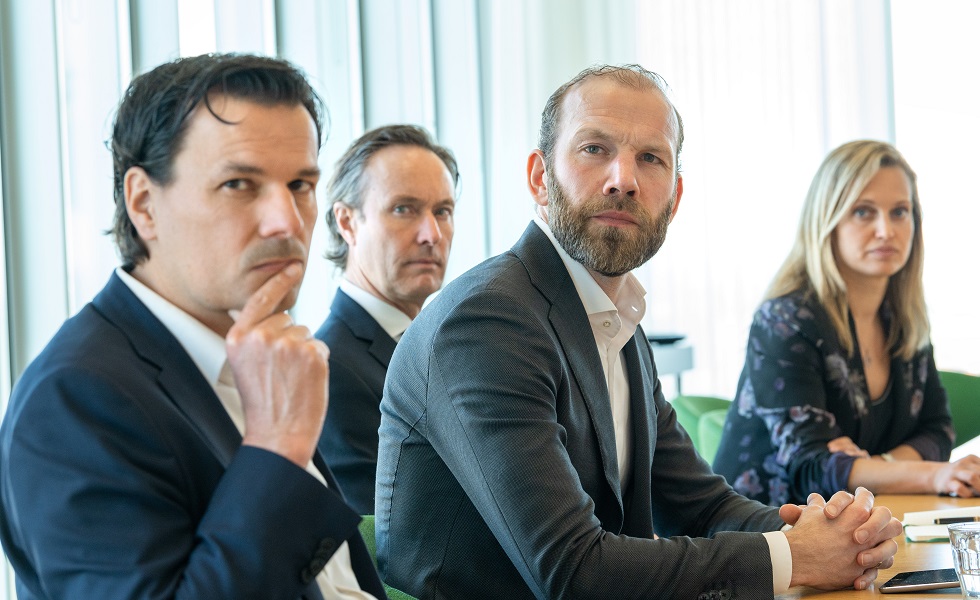Roundtable 'From Fossil Fuels to Renewable Energy': The power of capital
Roundtable 'From Fossil Fuels to Renewable Energy': The power of capital

This report was written in Dutch. This article is an English translation.
Whether it concerns the realization of a green power supply, the green development of emerging markets or the financing of innovative companies, capital plays a decisive role. How do you make the most impact? And what role is there for governments?
These and other questions were discussed during the Round Table 'From Fossil Fuels to Renewable Energy', in which seven experts, led by Don Gerritsen, shared their insights.
This is part 2 of the report.
By Ronald Bruins
|
Moderator:
Participants:
|
Electrify
Achieving CO2-neutral targets largely means electrification, says Labbat. 'The transition of the US transportation fleet to electric vehicles is expected to lead to a doubling of electricity demand by 2050. This will require large amounts of electricity to be added to the grid. The aim is not only to work emission-free, but also to guarantee the stability and reliability of the power supply. In this context, I think we cannot do without gas-fired plants by 2030, as an insurance strategy in case wind and solar fail to deliver, as these are intermittent sources.
Fossil fuels, primarily natural gas, will remain in the mix, but will make up a much smaller percentage over time. The advancements in technology are helping immensely, especially as costs come down. For example, large-scale batteries already function as a backup for solar energy today and will be further expanded over time to support the reliability of large-scale renewable energy sources.'
Van Berkel also advocates the capture and storage of CO2: Carbon Capture Storage (CCS). 'Then business cases arise for the use of that CO2. We are still looking for scalable investment opportunities. This also applies, for example, to 'green' hydrogen and e-fuels, or synthetic fuels. These are developments that are worth following as an investor. There are plenty of new technologies to invest in.'
One of the largest facilities
According to Gilligan, CO2 capture and storage have only a marginal effect on CO2 targets. At the same time, he notes that every little bit helps. 'In Europe, CCS projects are progressing steadily with a financial contribution from the European Union and with the support of local communities.'
Toledo sees a dilemma in oil and gas divestments. 'It's not that you solve the problem by definition, because another investor takes over those shares or bonds from you, with which you still haven't changed the world. Another question is how emerging countries want to deal with sustainability. China, Africa and India are emerging and you would like them to embrace this topic and take big steps in the field of sustainability. The energy transition must happen globally and not just in the developed world.'
The power of capital
'Every seller needs a buyer,' says Labbat. 'With every transfer of ownership, there must be a return for the next owner. You could say that in the game of exchanging ownership interests in existing fossil fuels, the selling investor cannot directly make a difference in sustainability. But you can if you control the capital flows to new projects.
When investors stop lending money to oil and gas projects or stop investing in oil pipeline construction, it makes an immediate difference. This withdrawal of capital directly increases the cost of capital for oil and gas projects, which are finding themselves unable to rely so easily on banks or the stock markets. Allocating capital to new projects is therefore done to change the path to sustainability.'
Hutten: 'It is not ‘either or’ but ‘and and’. We want to make an impact with companies that still rely on fossil energy to get them involved in the energy transition. To do that, we need to make our voices heard. I believe they can be part of the solution. That is better than completely exiting a sector. That doesn't change anything. There is also the risk that shares will be owned by market parties that are less environmentally minded.'
If the subsidy on fossil fuels is removed and a carbon tax is introduced whereby the polluter pays, their returns will also decrease. It is good to inform the directors of pension funds about that effect.
Make an impact
According to Hutten, making a concrete impact is possible through direct investments in renewable energy. 'In climate infrastructure directly, but also in venture capital and private equity funds that focus on this. You do need to know exactly what those parties are planning and what their horizon looks like. What are the risks they run versus the returns they provide? In that sense, as an investor you have to know what you are looking for and especially where to find it.'
Toledo notes that renewable energy generally has a fairly good relationship between risk and return. 'Renewable energy is a good investment case. This case fits in with the long-term strategy of pension funds. It may not be the returns we currently get from fossil fuels, but fossil fuels do not yet pay for all the climate damage it causes. In addition, the fossil fuel industry is still heavily subsidised. If the subsidy is removed and a carbon tax is introduced whereby the polluter pays, their returns will also decrease. It is good to inform the directors of pension funds about that effect. The return on fossil fuels may still be good in the short and medium term, but that doesn't mean it will stay that way.'
Inspirational business plans
Reznik sees in her practice that there are many investment cases in sustainable energy. 'There are plenty of business plans that are in line with the Paris Agreement and they are often very inspiring. Such as the plan of a company in which we invest. That company can convert a fleet of trucks from diesel to hydrogen. The business case is so logical that it is also attractive for investors.'
She also discusses the attractiveness of oil companies. 'I also think that they are still being subsidized too much. Another factor is that young employees no longer want to work for these companies, as they want to actively contribute to the energy transition because they feel an enormous commitment to it.'
Van Berkel is curious about the business model for renewable energy of the future. 'Oil companies are still an integrated player in oil. From the extraction from the ground to the gas station. But are oil companies also capable of transforming themselves into an integral player in the renewable market? Or will they become a player like Mitsubishi, which builds wind farms, solar parks and charging infrastructure, but also has the cars to use that energy? I am curious whether vertically integrated companies will emerge based on renewable energy.'
Dealing with renewable energy
Labbat points out the different ways governments deal with renewable energy. 'Some use the carrot, others the stick. The United States has clearly opted for the carrot. About $400 billion in new federal grants is now available for projects pursuing a range of energy transition options. From renewable energy to renewable fuels. Such incentives create an attractive investment climate and, more than the stick, lead to an acceleration of investments in renewable energy.'
Labbat points out that the United States has a long history of carbon capture and sequestration. 'The US has been injecting CO2 into the ground for over 40 years, mainly to extract oil from low-pressure fields. Thus, the know-how for handling, transporting and safely injecting high-pressure CO2 into the earth already exists. The increased US federal tax subsidies for CO2 capture make a very attractive investment case and enable us to improve many industrial production processes, such as the production of ammonia. or ethanol, to decarbonise. These are production processes that cannot be decarbonised by renewable adoption or electrification.'
Gilligan wonders if the US will maintain its generous subsidy policy for renewable energy projects under a new administration. Labbat: 'The US tax authorities have had subsidies for solar and wind energy and CO2 credits on their books for more than twenty years. Our history has shown that new governments do not withdraw subsidies already granted. It is also clear that renewable energy opportunities exist in both Democratic and Republican states. For example, there is twofold support for job creation associated with the energy transition.'
Part 1 of the Roundtable 'From Fossil Fuels to Renewable Energy' can be read here. Part 3 can be read here.
|
Don Gerritsen Don Gerritsen has been Director and Responsible Investment Leader at Deloitte since 2022. Prior to that, he held various senior positions at the PRI, UN and KPMG in the US, UK, Kenya and the Netherlands. He is the author of Guidance to Inspirational Leadership and Founder of the pro-bono mentoring initiative Pay It Forward. Gerritsen has an Executive MBA in Strategy and a Master in Public Administration. |
|
Mark van Baal Mark van Baal founded Follow This in 2015, a group of more than 9,000 green shareholders in Big Oil. Their mission is to enable shareholders to get oil and gas companies to reduce their emissions in line with the Paris Climate Agreement. Van Baal studied mechanical engineering and was an energy journalist, among other things. |
|
Dr. Ir. Arij van Berkel Dr. Ir. Arij van Berkel is Senior Vice President at Lux Research where he leads the energy transition team. Until 2015 he worked at TNO, eventually as Innovation Director Chemistry, in close collaboration with the European Commission, for innovation and transition of the chemical industry. Before that, he researched process safety at Shell. Van Berkel studied Mechanical Engineering at the University of Twente and obtained his PhD at Eindhoven University. |
|
Mark Gilligan Mark Gilligan is Head of Infrastructure bij AXA IM Alts, waar hij verantwoordelijk is voor de ontwikkeling van het beleggingsplatform voor infrastructuuraandelen. Zijn beleggingsstrategie wordt gedreven door de overtuiging dat klimaatverandering hét grote probleem van deze eeuw is en dat verstandige institutionele eigenaren zich moeten richten op de ontwikkeling van infrastructuur die geschikt of aanpasbaar is voor een net zero-wereld. |
|
Marc Hutten Marc Hutten is Senior Investment Solutions Specialist at Achmea Investment Management. He joined Interpolis/Achmea in 2005 and previously worked for SBA and SNS Asset Management. From 2016 to 2021, he was a member of the Board of Stichting Pensioenfonds Achmea and a member of the Risk Committee. He holds an MSc in Business Economics from the University of Groningen and an MSc in Investment Management from the Free University of Amsterdam. |
|
Pete Labbat Pete Labbat is a Managing Partner of ECP, a North American infrastructure investor with a focus on the energy transition and environmental sustainability. He is Chairman of the Investment Committee and the Valuation Committee and a member of the ESG Committee and Management Committee. Prior to joining ECP in 2006, he spent 13 years in the Investment Banking Division of Goldman Sachs, eventually as Managing Director. |
|
Olena Reznik Olena Reznik is an Investment Director at Mirova (part of Natixis IM), where she has worked since 2015. Before that, she was active in renewable energy at AREAM (Voigt & Collegen), where she joined in 2011. The five years before that she worked at Deloitte. She holds a Masters in Accounting, Controlling & Audit (Sorbonne, Paris) and a Dipl. kfm. in Business Administration (Rostock University). |
|
Angeles Toledo Angeles Toledo is Lead Sustainable Investments Advisor at Blue Sky Group. Before that, she was Fund Manager of Triodos Groenfonds. She has experience with public and private markets and in recent years has specialized in the energy transition and impact investing. In 2021 she won the Women Smart Energy Award, Category Finance. Since 2022 she is part of the Top 50 Women in Sustainable Finance in the Netherlands. |


















